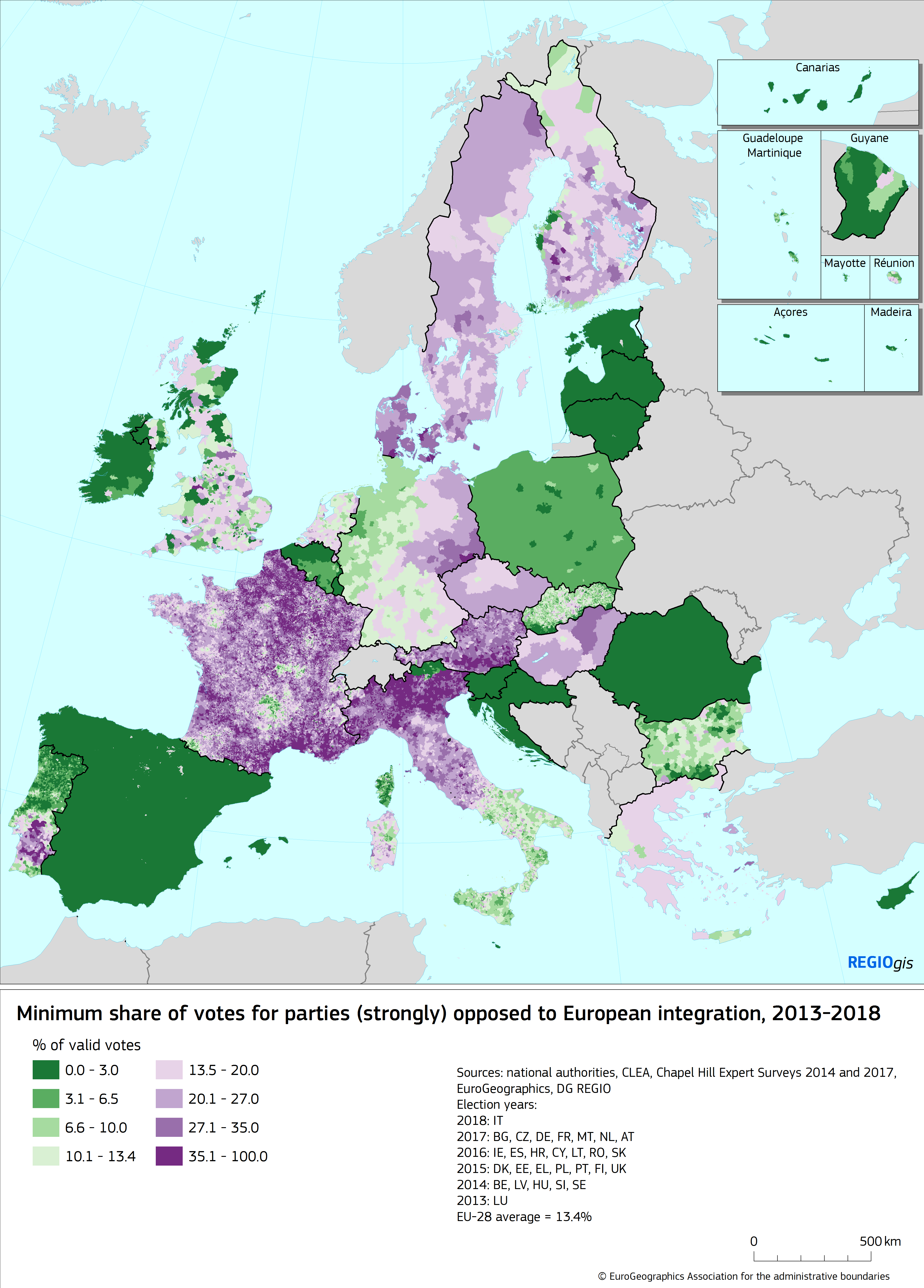This blog, written by our alum Lewis Dijkstra offers some striking insights into the share of the vote across Europe that has to gone to parties considered strongly opposed to European integration. It is vital to understand the motivation for these votes and to dispel any myths about them, in order to better understand the next steps in European regional investment, making it the benefits associated with it and its origin more obvious. One key finding, which may help to quell the rise of strongly Eurosceptic discourse is that we need a clear and simple narrative that illustrates the benefits of European integration to all EU citizens.
By Dr Nancy Holman, Director of Planning Studies, LSE
The geography of EU discontent and how can we address it?
Since 2004, votes for parties opposed to EU integration have doubled. To understand the geography of this EU discontent, we gathered the results of the last national election between 2013 and 2018 in more than 63,000 electoral districts in the EU28. In these elections, one in four votes went to a Eurosceptic party. This rich data set has allowed us to identify which characteristics are linked to higher anti-EU voting.
Low economic growth, low employment rates, low levels of education, low turn-out, low density and low shares of young people are consistently linked to more votes for Eurosceptic parties. One indicator, however, yielded a surprising result: areas with a higher GDP per head had more Eurosceptic votes. The combination of higher levels of GDP per head and low economic growth and industrial decline suggest that it is not the poorest places that are voting against EU integration, but the places that used to be richer and used to have more and better paying jobs. In addition, affluent areas may be more prone to believe that they do not need the EU and that they would be better off leaving the union.
Euroscepticism exists on both sides of the political spectrum. About three quarters of the anti-EU votes go to right-wing parties and one quarter to left-wing anti-EU parties. The factors linked to these votes, however, differ. Votes for right-wing anti-EU parties are higher in rural areas and areas that have more people without a university degree and more people aged 40 to 64. Votes for left-wing anti-EU parties are higher in cities and in areas with more university graduates and more people aged 65 and above. Migration plays a complex role. Migrants from other EU countries reduce right-wing anti-EU voting, but non-EU migrants increase it. This may be linked to the better economic integration of EU migrants. In contrast, the presence of migrants has no discernible impact on left-wing anti-EU voting.

Cornwall and Wales, two regions that have received substantial funding from the EU for regional development, voted leave in the Brexit referendum. This has raised the question whether cohesion policy has had any impact on the growing EU discontent or whether it may have exacerbated discontent by raising expectations it cannot fulfil. The evidence to support this point of view, however, is scarce and, often, contradictory. Our analysis shows that cohesion policy investment since 2000 are linked to lower votes for parties opposed to European integration. We tested this for different periods of investment, different levels of opposition to EU integration and different policy domains and consistently find that more cohesion policy investments are linked to fewer anti-EU votes. This tempering effect of cohesion policy could occur directly when people are aware and supportive of these investments or indirectly when people may not be aware of the origin of the funding but still benefit from its results.
The policy implications of this analysis are manifold. Cohesion policy already aims to promote economic growth, including in declining middle-income regions, to boost education and employment rates and to facilitate the integration of non-EU migrants into the labour market. If successful, this will help to reduce EU discontent. Raising awareness about EU investments may show people that the EU is trying to improving the quality of life in their region. Nevertheless, EU investments alone cannot turn the tide of rising Euroscepticism. A clear and simple narrative is needed that explains to people in all regions, rich and poor, growing and declining, urban and rural, how being part of the EU improves their lives today and in the future.
Watch now on Youtube our Webinar on Regional Growth, Local Development, and Euroscepticism
Crescenzi, Riccardo and Di Cataldo, Marco and Giua, Mara, It’s Not About the Money! EU Funds, Local Opportunities, and the Brexit Vote (November 9, 2019). LEQS Paper No. 149, Available at SSRN: https://ssrn.com/abstract=3489134 or http://dx.doi.org/10.2139/ssrn.3489134
Dijkstra, L. & Rodriguez Pose, A. (2020) Does cohesion policy reduce EU discontent and Euroscepticism? Papers in Evolutionary Economic Geography (PEEG) Available at: http://econ.geo.uu.nl/peeg/peeg2040.pdf



